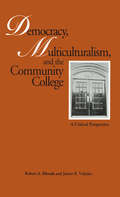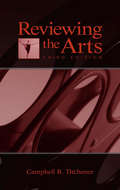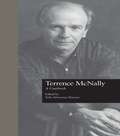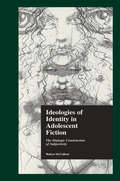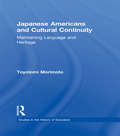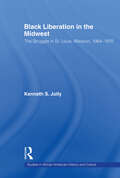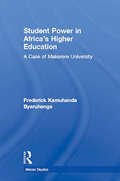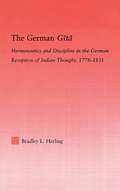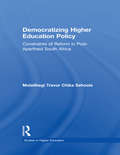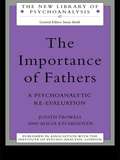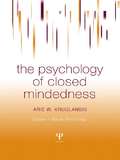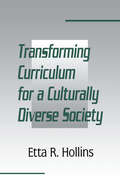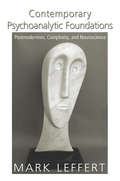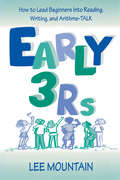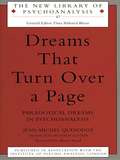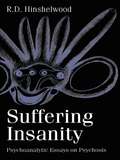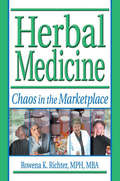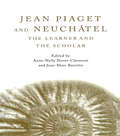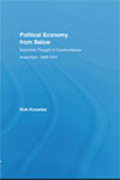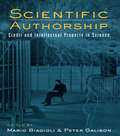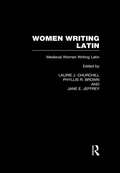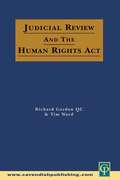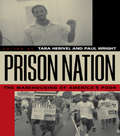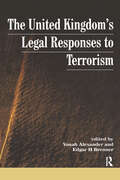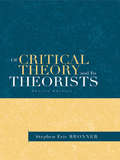Special Collections
Benetech’s Global Certified Accessible Titles
Description: Benetech’s GCA program is the first independent third-party EPUB certification to verify ebook accessibility. By creating content that is born accessible, publishers can meet the needs of all readers. Learn more: https://bornaccessible.benetech.org/
- Table View
- List View
Democracy, Multiculturalism, and the Community College
by Robert A. Rhoads and James R. ValadezFirst Published in 1996. Routledge is an imprint of Taylor & Francis, an informa company.
Reviewing the Arts
by Campbell B. TitchenerReviewing the Arts is written for those media writers assigned to review an artistic event or performance, providing the tools for a journalist to write informed and enlightened reviews of the arts. This useful text guides writers through the steps for producing an acceptable review of fine and performing arts, covering the range of arts from film and television to drama and dance; from sculpture and architecture to music. Author Campbell Titchener suggests ways to approach both familiar and unfamiliar art forms to prepare an informed evaluation, and in this updated third edition he includes current examples from practicing journalists and veteran critics. This practical text fits readily into the journalism curriculum, and will be a useful resource for practicing journalists.
Terrence McNally
by Toby Silverman ZinmanFirst Published in 1997. Routledge is an imprint of Taylor & Francis, an informa company.
Ideologies of Identity in Adolescent Fiction
by Robyn McCallumIdeologies of Identity in Adolescent Fiction examines the representation of selfhood in adolescent and children's fiction, using a Bakhtinian approach to subjectivity, language, and narrative. The ideological frames within which identities are formed are inextricably bound up with ideas about subjectivity, ideas which pervade and underpin adolescent fictions. Although the humanist subject has been systematically interrogated by recent philosophy and criticism, the question which lies at the heart of fiction for young people is not whether a coherent self exists but what kind of self it is and what are the conditions of its coming into being. Ideologies of Identity in Adolescent Fiction has a double focus: first, the images of selfhood that the fictions offer their readers, especially the interactions between selfhood, social and cultural forces, ideologies, and other selves; and second, the strategies used to structure narrative and to represent subjectivity and intersubjectivity.
Japanese Americans and Cultural Continuity
by Toyotomi MorimotoFirst Published in 1997. Routledge is an imprint of Taylor & Francis, an informa company.
Black Liberation in the Midwest
by Kenneth JollyThis book offers a response to the inadequate examination of the Midwest in Civil Rights Movement scholarship - scholarship that continues to ignore the city of St. Louis and the Black liberation struggle that took place there. Jolly examines this local movement and organizations such as the Black Liberators, Mid-City Congress, Jeff Vander Lou Community Action Group, DuBois Club, CORE, Zulu 1200s, and the Nation of Islam to illuminate the larger Black liberation struggle in the Midwest in the mid- and late 1960s. Furthermore, this work details the larger atmosphere and conditions in St. Louis, Missouri and the Midwest from which this local movement developed and operated. This work raises important questions about periodizing and locating Black liberation and Black Nationalism. As racial oppression in the United States was equated with neo-colonialism and internal-colonialism, this discussion reveals the global nature of white supremacy, race and class oppression and exploitation, as well as the material and ideological relationship between local and transnational liberation movements.
Student Power in Africa's Higher Education
by Frederick K. ByaruhangaThis book, the first of its kind to treat Uganda, provides a historical analysis of the role of student voices in the development of Uganda's higher education. It not only chronicles incidents of student protests, but also explores and analyses their trigger points as well as the strategies employed by the university, the government, and the students to manage or resolve those crises. In addition, the book highlights the role played by national politics in shaping student political consciousness, in particular their involvement in protests, riots and demonstrations. The book, therefore, limits its scope to the unfolding and impact of student crisis on the process of higher education. Byaruhanga recommends that colleges and universities need to increase communication with students, as well as promote student involvement in decision and policy making, among other things, in order to forestall future conflicts. Most distinctively, the book aims to address the current paucity of research on student activism in Uganda's higher education, and highlights the critical need for research on higher education in Africa as a field of study. The book also may serve as a base for cross-national comparative analysis.
The German Gita
by Bradley L. HerlingHow did the Bhagavadgãtà first become an object of German philosophical and philological inquiry? How were its foundational concepts initially interpreted within German intellectual circles, and what does this episode in the history of cross-cultural encounter teach us about the status of comparative philosophy today? This book addresses these questions through a careful study of the figures who read, translated and interpreted the Bhagavadgãtà around the turn of the nineteenth century in Germany: J.G. Herder, F. Majer, F. Schlegel, A.W. Schlegel, W. von Humboldt, and G.W.F. Hegel. Methodologically, the study attends to the intellectual contexts and prejudices that framed the early reception of the text. But it also delves deeper by investigating the way these frameworks inflected the construction of the Bhagavadgãtà and its foundational concepts through the scholarly acts of excerpting, anthologization, and translation. Overall, the project contributes to the pluralization of Western philosophy and its history while simultaneously arguing for a continued critical alertness in cross-cultural comparison of philosophical and religious worldviews.
Democratizing Higher Education Policy
by M.T. SehooleThis book was written with the purpose of analyzing the challenges faced by the post-apartheid government in South Africa with regard to reform of higher education. It covers the apartheid context of higher education, resistance to the system and its ultimate demise, democratic processes in post-apartheid reform agenda and how this agenda was emptied of its radical content as a result of global and local pressures. Highlighted are key constraints in the reform process, including the compromise pact agreed upon between the apartheid government and the ruling African National Congress, the rapidly globalizing environment underpinned by neoliberal principles within which South Africa's transition took place, shifts in macro-economic policies of government towards neo-liberal policy, the inheritance of the bureaucracy and the inexperience of new government officials. These are presented in a narrative style that combines the author's experience, the voices of key players involved and important data from a range of documentary sources. This is the first single authored book in post-apartheid South African that has systematically looked at higher education reform.
The Importance of Fathers
by Judith Trowell and Alicia EtchegoyenIt is widely acknowledged that children need structure, security, stability and attachment to develop and flourish, and that the father is an important part of this. Issues such as high divorce rates, new family structures, increased mobility, women's liberation and contraception are very common in society. This book sets out to explore what has happened to men and to fathers during all these changes and transitions. Judith Trowell and Alicia Etchegoyen, along with an array of renowned contributors, consider the importance of fathers in various situations, including: the role of the father at different stage of children's development the missing father loss of a father grandfathers. It is argued that the father is important, not only to support the main carer (usually the mother) but also to provide a caring, thinking, comfortable, confident presence.
The Psychology of Closed Mindedness
by Arie W. KruglanskiThe fundamental phenomenon of human closed-mindedness is treated in this volume. Prior psychological treatments of closed-mindedness have typically approached it from a psychodynamic perspective and have viewed it in terms of individual pathology. By contrast, the present approach stresses the epistemic functionality of closed-mindedness and its essential role in judgement and decision-making. Far from being restricted to a select group of individuals suffering from an improper socialization, closed-mindedness is something we all experience on a daily basis. Such mundane situational conditions as time pressure, noise, fatigue, or alcoholic intoxication, for example, are all known to increase the difficulty of information processing, and may contribute to one's experienced need for nonspecific closure. Whether constituting a dimension of stable individual differences, or being engendered situationally - the need for closure, once aroused, is shown to produce the very same consequences. These fundamentally include the tendency to 'seize' on early, closure-affording 'evidence', and to 'freeze' upon it thus becoming impervious to subsequent, potentially important, information. Though such consequences form a part of the individual's personal experience, they have significant implications for interpersonal, group and inter-group phenomena as well. The present volume describes these in detail and grounds them in numerous research findings of theoretical and 'real world' relevance to a wide range of topics including stereotyping, empathy, communication, in-group favouritism and political conservatism. Throughout, a distinction is maintained between the need for a nonspecific closure (i.e., any closure as long as it is firm and definite) and needs for specific closures (i.e., for judgments whose particular contents are desired by an individual).Theory and research discussed in this book should be of interest to upper level undergraduates, graduate students and faculty in social, cognitive, and personality psychology as well as in sociology, political science and business administration.
Transforming Curriculum for A Culturally Diverse Society
by Etta R. HollinsThe intention of this book is to engage educators in transforming the public school curriculum for a culturally diverse society. This means more than including knowledge about diverse populations. It means reconceptualizing school practices through debate, deliberation, and collaboration involving the diverse voices that comprise the nation. Certain key questions must be addressed in this process: * What should be the purpose of schooling in a culturally diverse society? * Who should be involved in curriculum planning and what process should be employed? * How is the actualized curriculum differentiated? * What is the relationship between school practices and the structure of the larger society? * How should the curriculum be evaluated? The authors of the essays in this book address critical perspectives from which a framework is constructed for a discourse on planning curriculum for a culturally diverse society. In a substantive introduction, Hollins presents the major themes and overall goals of the book and describes how the readings in each of the four parts are linked to each other and to these themes and goals. Each part begins with critical questions and an overview to provide a framework and a focus for the readings that follow, and concludes with suggested learning experiences.
Contemporary Psychoanalytic Foundations
by Mark LeffertPast scholars have tried to classify psychoanalysis as an intrinsically positivist science, with varying degrees of success. Their critics have fared little better with narrow applications of postmodern thought, which focus on smaller areas within psychoanalysis and, as a result, neglect the evolution of the discipline as a whole. In an effort to provide a ground for current psychoanalytic thought, Mark Leffert creates an interreferential schema which balances the influences of postmodernism, complexity theory, and neuroscience as its key factors. Using the heterogeneity of postmodern thought as a starting point, he traces its impact on and implications for the development of the discipline, leading into the realm of complexity theory – which is relatively new to the psychoanalytic literature – and how it informs as well as constrains certain psychoanalytic assumptions. The book then turns to neuroscience, the "hard" scientific study of the complexities of the brain, and how recent research informs psychoanalytic theory and may shed light on aspects of memory, the conscious, and the unconscious. Taken together, these three elements create a firm basis for the current trends in psychoanalysis and the direction of its development in the years to come.
Early 3 Rs
by Lee MountainThis practical, reader-friendly textbook for preservice and in-service early childhood education and early literacy courses provides "how-to-do-it" instructions for promoting emergent literacy in reading, writing, and arithmetic from preschool into the primary grades. Early 3 Rs answers the question: "What can I SAY and DO to give each child the best possible start on the 3 Rs?" With the strategies and materials in this book, a teacher can give personalized direct instruction in the 3 Rs to a beginner, in just a few minutes a day. The early chapters tell how to prepare a young child for reading, writing, and arithmetic. Subsequent chapters show how to give a beginner an early start on learning the 3 Rs. All strategies begin with the oral approach (from phonemic awareness to "arithme-talk") and then progress to print that is personally meaningful to a young child. Early 3 Rs: * Includes arithmetic as a component of early literacy. * Gives developmentally appropriate methods for direct teaching of the 3 Rs. * Provides scripts of what the teacher can say to promote early learning. * Helps education students in field-based classes offer personalized instruction. Early 3 Rs is written to be very reader friendly: the approach is intentionally eclectic; the writing deliberately avoids heavy theory; the goal is to provide an easy-to-use, highly practical and accessible guide for those who work in early childhood education settings.
Dreams That Turn Over a Page
by Jean-Michel QuinodozWinner of the 2010 Sigourney Award! In Dreams That Turn Over a Page, the author discusses a particular type of dream that comes after a phase in analysis where integration has taken place. Accompanied by anxiety and fear, which seem surprising as the dream follows a phase of integrative work in the analysis, these dreams are in fact a mark of progression as they indicate a capacity to own anxiety. Quinodoz describes the important technical implications of this understanding, suggesting that it is essential to interpret to the patient that the anxiety indicates not a regression, but a shift in the opposite direction. In addition to the theory and discussion of the literature, he gives many clinical examples of such dreams from patients in psychoanalysis to illustrate the concepts of dreams that turn over a page. As Freud's classical theory of dreams does not by itself suffice to interpret or explain the formation of these particular dreams, Quinodoz invokes contemporary ideas to understand the underlying transformations which bring the 'return' of split-off parts of the self during the phases of integration. The author considers the reasons why dreams that mark this transition have a more powerful impact than others on both patient and analyst, and observes similarities between the clinical impact of such a dream and the aesthetic impact of a work of art.
Suffering Insanity
by R. D. HinshelwoodWhen madness is intolerable for sufferers, how do professional carers remain sane? Psychiatric institutions have always been places of fear and awe. Madness impacts on family, friends and relatives, but also those who provide a caring environment, whether in large institutions of the past, or community care in the present. This book explores the effects of the psychotic patient's suffering on carers and the culture of psychiatric services. Suffering Insanity is arranged as three essays. The first concerns staff stress in psychiatric services, exploring how the impact of madness demands a personal resilience as well as careful professional support, which may not be forthcoming. The second essay attempts a systematic review of the nature of psychosis and the intolerable psychotic experience, which the patient attempts to evade, and which the carer must confront in the course of daily work. The third essay returns to the impact of psychosis on the psychiatric services, which frequently configure in ways which can have serious and harmful effects on the provision of care. In particular, service may succumb to an unfortunate schismatic process resulting in sterile conflict, and to an assertively scientific culture, which leads to an unwitting depersonalisation of patients. Suffering Insanity makes a powerful argument for considering care in the psychiatric services as a whole system that includes staff as well as patients; all need attention and understanding in order to deliver care in as humane a way as possible. All those working in the psychiatric services, both in large and small agencies and institutions, will appreciate that closer examination of the actual psychology and interrelations of staff, as well as patients, is essential and urgent.
Herbal Medicine
by Virginia M Tyler and Rowena RichterAmericans seeking herbal medicines now face confusion and even danger. There is great potential for these medicines to improve the health of consumers--if current regulations can be revised!Herbal Medicine: Chaos in the Marketplace is a prize-winning critique of the regulation and business of herbal medicine in the United States. It is the first book that examines the big picture issues-it tells the story of how the present situation developed, looks at what it means for consumers, compares approaches taken in other industrialized countries, and recommends where we need to go from here. Convenient reference tables provide easy access to information.Concerns about herbal medicines are hitting the headlines regularly, yet no other book has examined the core issues in depth from a public health perspective. Herbal Medicine: Chaos in the Marketplace fills that gap. It is highly relevant today, and you’ll find it will continue to be indispensable reading for years to come as the situation plays out.This balanced, unique, and insightful volume will add to your knowledge of herbal medicine regulation and its impact on consumer health by: framing the limitations of the current situation with brief examples reviewing the regulatory history of herbal medicines in the United States placing the situation in an international context by also examining regulations in Canada, Germany, France, and the United Kingdom illustrating the practical implications of U.S. regulations with six examples that demonstrate how herbal medicines could contribute more to consumer health--and the public health risks associated with the current regulatory situation analyzing the public health issues related to safety, research, clinical practice, consumer interests, business, media, and federal government offering key, high-impact recommendations for future policyConsumers, health care professionals, business people in the domestic and foreign herb industries, researchers, health plan executives, food and drug attorneys and policymakers, as well as educators and students, will all find this book essential to their understanding of the workings of the herbal medicine industry. Visit the author’s website at http://www.herbalchaos.com
Jean Piaget and Neuchâtel
by Anne-Nelly Perret-Clermont and Jean-Marc BarreletJean Piaget is widely acknowledged as one of the most important scholars of the twentieth century. His passionate philosophical search for an understanding of the nature of knowledge led him to make major contributions to the study of child development and epistemology. But how did his early life in Neuchâtel inspire him to embark on this search? Taking a socio-historical and cultural perspective, this book outlines the development of Piaget's understanding of major issues regarding mind, faith, science, logic, peace, and social rights in a time of anxiety. and world wars The international and multidisciplinary contributors investigate Piaget the adolescent as he begins his quest for autonomy of reason and sets out to create his own explanatory system for cognitive growth. The latter part of the book goes on to consider the early reception of Piaget's work in different cultural contexts and his impact on issues of psychology and educational reform. Piaget's theoretical system can be seen as an expression of the values he developed during his childhood and adolescence as he searched for the conditions of reciprocal relationships and rational dialogues. Jean Piaget and Neuchâtel demonstrates that in today's climate, the questions Piaget addressed remain very relevant and invite new enquiries from different standpoints. This book will therefore be of interest to psychologists, educators, and philosophers. This book is published with the support of Pro Helvetia, Swiss Arts Council.
Political Economy from Below
by Rob KnowlesCommunitarian anarchism is a generic form of socialism that denies the need for a state or any other authority over the individual from above, and which requires absolute belief that the individual cannot exist outside of a community of others. This book suggests that the communitarian anarchists of the nineteenth century developed and articulated a distinct tradition of economic thought. The period of this study begins with the first major writing of the French communitarian anarchist, Pierre-Joseph Proudhon, in 1840 and ends with the temporary burial of anarchist theorizing at the beginning of the First World War in 1914. However, he tradition of communitarian anarchist economic thought did not end in 1914. The economic thought explored in this book provides a fresh perception of the fragmentation evident in many societies today, especially where there is a substantial "informal economy."
Scientific Authorship
by Mario Biagioli and Peter GalisonFirst Published in 2003. Routledge is an imprint of Taylor & Francis, an informa company.
Women Writing Latin
by Laurie J. Churchill and Phyllis R. Brown and Jane E. JeffreyThis book is part of a 3-volume anthology of women's writing in Latin from antiquity to the early modern era. Each volume provides texts, contexts, and translations of a wide variety of works produced by women, including dramatic, poetic, and devotional writing. Volume Two covers women's writing in Latin in the Middle Ages.
Judicial Review & the Human Rights Act
by Richard Gordon and Tim WardThe Human Rights Act 1998 had a profound effect on the law of the United Kingdom,and in no area more so than judicial review. This book gives practical guidance on the interplay between the Act and domestic public law.
Prison Nation
by Paul Wright and Tara HerivelFirst Published in 2003. Routledge is an imprint of Taylor & Francis, an informa company.
UK's Legal Responses to Terrorism
by Yonah Alexander and Edgar H BrennerFirst published in 2003. Routledge is an imprint of Taylor & Francis, an informa company.
Of Critical Theory and Its Theorists
by Stephen Eric BronnerOf Critical Theory and its Theorists is an intelligent , accessible overview of the entire Critical Theory Tradition, written by one of the leading experts on the subject. Filled with original insights and valuable historical narratives, Of Critical Theory and Its Theorists covers the work of major philosphical thinkers such as Benjamin, Horkheimer, Adorno, Marcuse and Habermas and revisits the contributions of lesser-known figures such as Karl Korsch and Ernst Bloch. Bronner measures the writing of these theorists against each other, postmodernist philosophers and the critical tradition reaching back to Hegel. Of Critical Theory and Its Thoerists presents new insights useful to experienced scholars and offers clear summaries for students making this book an ideal introduction to the debates surrounding one of the most important intellectual traditions of the 20th Century.
